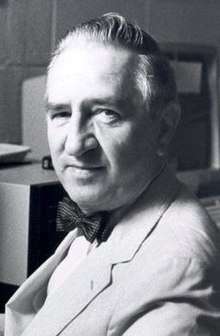Richard Skalak
Richard Skalak (February 5, 1923 – August 17, 1997) was an American pioneer in biomedical engineering. He is known for his groundbreaking work in the mechanics of blood flow, bone growth, white blood cell response to infections, and biological implications and responses to implants.[1][2] He won numerous significant scientific honors over his career, including election to the National Academy of Engineering in 1988.[3][4] He is the namesake of the ASME Richard Skalak Award.
Richard Skalak | |
|---|---|
 | |
| Born | February 5, 1923 |
| Died | August 17, 1997 (aged 74) |
| Scientific career | |
| Fields | Biomedical engineering |
| Institutions | Columbia University |
Awards and honors
- Chair Applied Mechanics Division, 1979
- Theodore von Karman Medal, 1987
- National Academy of Engineering, 1988
- Ted Belytschko Applied Mechanics Award, 1997
- Poiseuille Medal of the International Society of Biorheology[1]
- Fellow, American Society of Mechanical Engineers[4]
- Fellow, American Academy of Mechanics[4]
- Fellow, American Society of Civil Engineers[4]
- Fellow, New York Academy of Medicine[4]
- Fellow, American Association for the Advancement of Science[4]
gollark: The purpose written down somewhere doesn't really matter if people with different preferences try and shape it in their way, or if it doesn't actually work well at satisfying that purpose.
gollark: There are those who'd say it should be to punish criminals, or who say it's just the state enforcing its power.
gollark: Also, I don't think people agree on that being the point.
gollark: It can't be effective at that if people can just work around *it* when they want to.
gollark: Perfect robustness is probably not practical in human social infrastructure but it can at least be better.
References
- Skalak, T.C. (1999) A Dedication in Memoriam of Dr. Richard Skalak, Annual Review of Biomedical Engineering 1, 1-18.
- Richard Skalak, Bioengineer 74, The Record of Columbia University 23(2), 1997.
- Hilchey, T. (1997) Richard Skalak, 74, Pioneer In Bioengineering, Is Dead, The New York Times.
- Chien, S. (2001) Richard Skalak, Memorial Tributes of the National Academy of Engineering 9, 254-259.
This article is issued from Wikipedia. The text is licensed under Creative Commons - Attribution - Sharealike. Additional terms may apply for the media files.